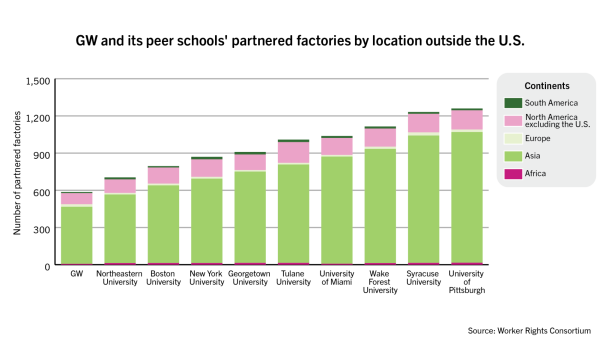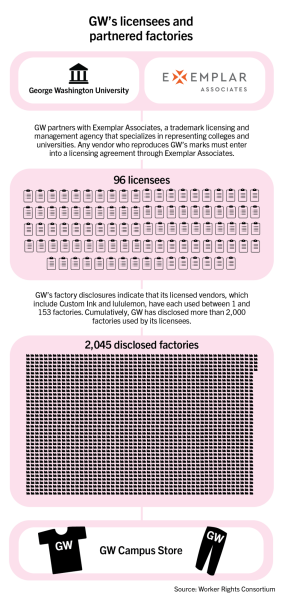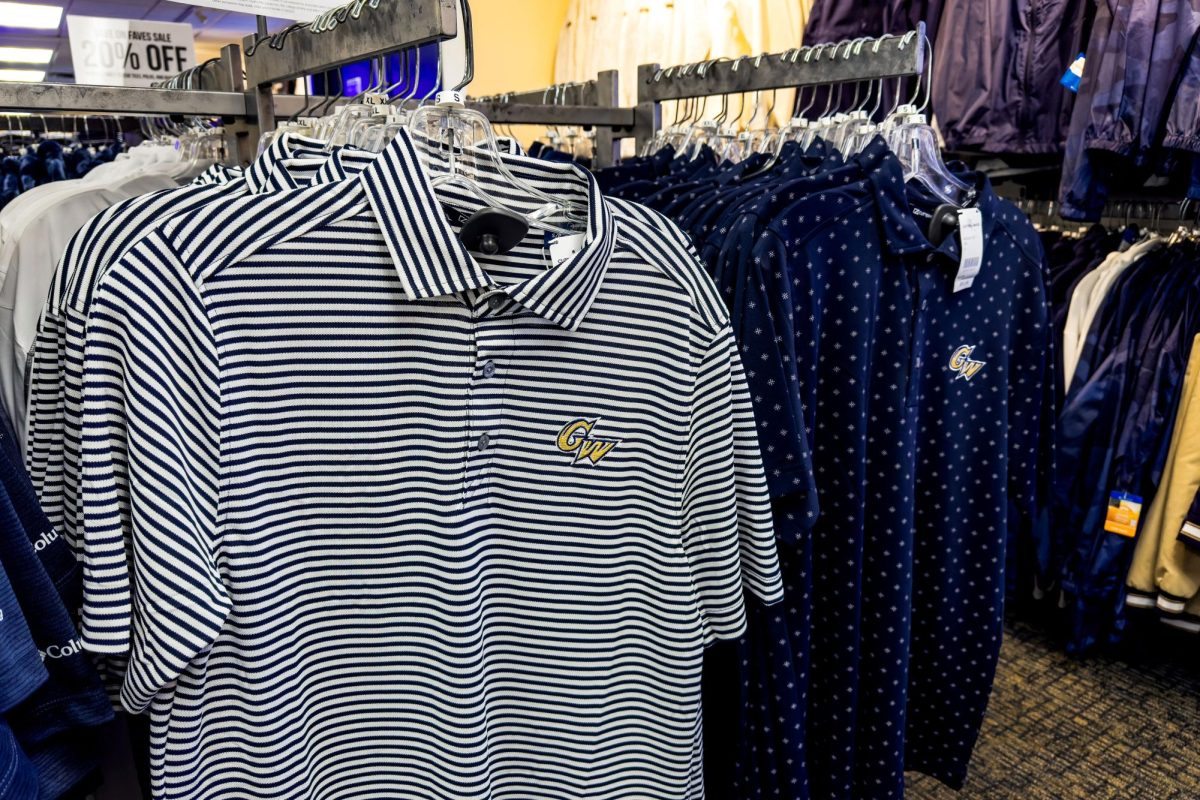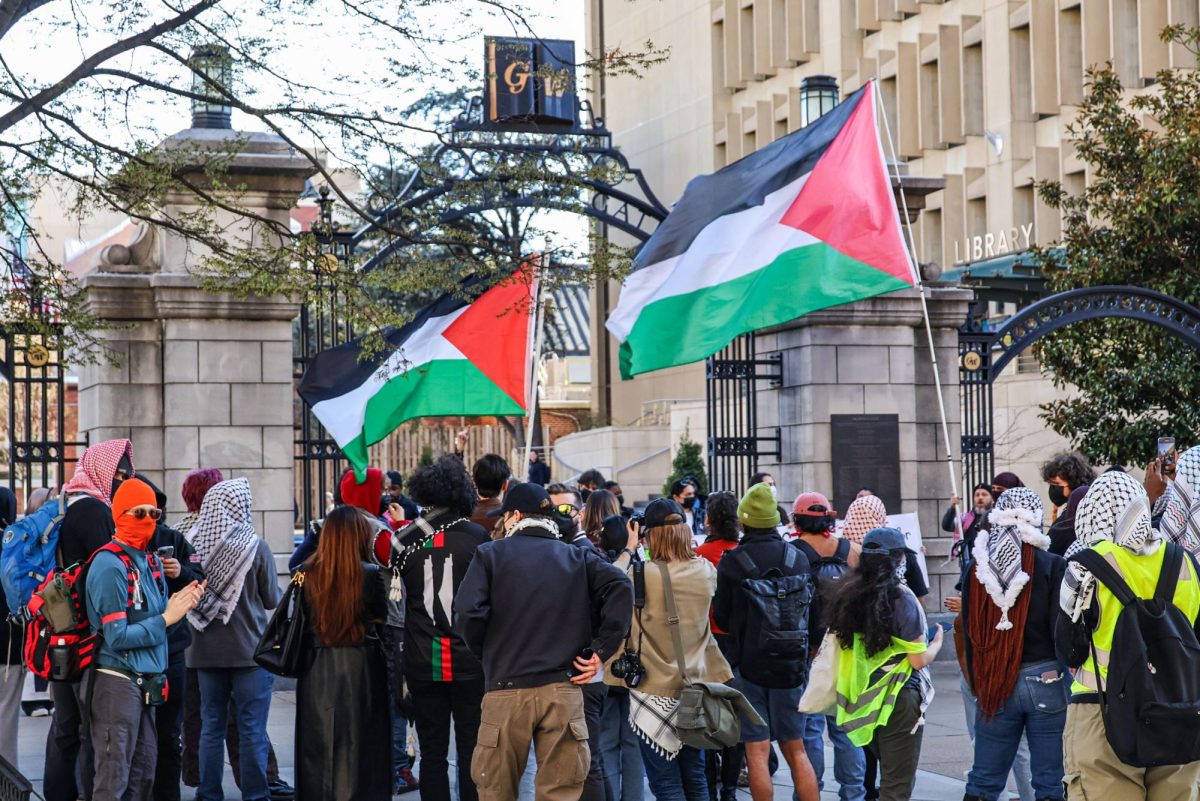Most factories producing GW-branded apparel investigated for workers’ rights concerns have improved their labor policies as universities work to ensure branded-apparel workers are treated fairly by employers.
GW is one of 146 colleges and institutions that reports data on the factories that produce their apparel to the Worker Rights Consortium, an organization that investigates labor rights. The WRC has investigated at least 14 factories since 2002 that produce GW-branded apparel like jackets, hats and shirts and discovered cases of wage theft, unpaid severance, the firing of union leaders and mandatory prayers for workers.
The Worker Rights Consortium investigated more than a dozen factories GW listed on its most recent quarterly report, released Oct. 1, with factories where investigations previously found wrongdoing improving their workplace conditions. Nine investigations found violations relating to wage theft, unpaid severance, injury compensation or benefits, and eight investigations found unfair labor practices related to unionization efforts in factories like the retaliatory firing of workers trying to organize. Four investigations found health and safety issues and two found gender discrimination.
GW allows more than 90 licensees to source factories producing their branded apparel. GW’s October report included a list of the more than 2,000 factories around the world its licensees use to create GW-branded apparel.
University spokesperson Julia Metjian said the University joined the WRC in 2008 following student efforts to raise awareness about worker safety in the garment industry. She said GW began requiring its licensees that use factories in Bangladesh to produce GW-branded apparel sign the Accord on Fire and Building Safety in Bangladesh in 2014.
“The University’s goal is to ensure that apparel bearing GW’s marks be manufactured in a socially and ethically responsible manner,” Metjian said in an email.
Nine of GW’s 12 peer schools are WRC affiliates. Two of GW’s peer schools — the universities of Southern California and Rochester — are not affiliated with the WRC. Tufts University was unavailable for the Oct. 1 period.

Jessica Champagne, the WRC’s deputy director for field operations and strategy, said universities can leverage their contracts with licensees to advocate for labor-rights standards more than individual consumers, who have less connection to the source of the apparel they purchase.
“Universities can really have an impact that is much bigger than any individual consumer,” Champagne said. “So it actually means that we’ve been able to see a lot of improvement in many factories that produce for the collegiate market and also have an impact on expectations in the broader apparel sector.”
Champagne said in many cases, student activism pushed universities to pay attention to the labor producing their branded apparel. She said the WRC grew out of student concern for workers in the textile industry in the late 1990s.
“People feel very emotionally connected to the logos, to the universities, to the clothes that they wear to sports games,” Champagne said. “And so students began raising these questions with their universities.”
GW reports that about 70 percent of the factories it partners with are based in the United States. But while some garment production occurs in the U.S., these reports may instead list the American headquarters of a factory located overseas, Champagne said. It is unclear where all factories are actually located.
GW disclosed that it sources branded apparel from 220 factories in China, 82 factories in Vietnam, 39 in Canada and 35 in Pakistan in its most recent quarterly disclosure. GW also lists factories in South America, Africa and Europe.
Champagne said by affiliating with the WRC, universities ensure the groups that create their branded products live up to “certain basic labor standards” by disclosing the factories they source and providing information for WRC investigations. Since 2009, the WRC has recovered more than $106 million in total back pay for more than 470,000 workers, with 60 percent of funds coming from cases that involve collegiate apparel across the WRC's 146 affiliate institutions, she said.
“A basic strong first step is to affiliate to WRC,” Champagne said.

One of the factories GW disclosed in its October report is Shahi Exports Unit 8, an Indian factory producing clothing for the clothing brand Columbia that GW partners with. GW sells Columbia-brand jackets produced in India at the Campus Store in the basement of the University Student Center, which is expected to relocate to 2100 Pennsylvania Ave. by the end of fall 2023, Metjian said.
WRC investigated Shahi Exports Unit 8 from 2018 to 2022 and found “the worst wage theft” the consortium has documented in the global garment industry after factory owners refused to pay workers the newly increased legal minimum wage in April 2020. Shahi Exports, the factory's umbrella company and India’s largest garment manufacturer, announced that it would begin paying its 80,000 employees in Karnataka the correct minimum wage in February 2022 following a lawsuit filed by the Garment and Textile Workers’ Union, per the WRC’s investigation summary.
Workers testified that Uni Gears Ltd., which GW disclosed in its most recent quarterly report as a factory producing its branded apparel, began forcing workers to resign in May 2020 under threat of violence to minimize their obligation to pay severance. Eight of GW’s peer schools also listed Uni Gears Ltd. in their quarterly factory disclosures.
The WRC also found in an investigation spanning January to April of 2018 that League Central America, a factory in El Salvador for League Collegiate Wear producing GW-branded T-shirts, required workers to stay at the factory for an extra, unpaid half-hour to take mandatory English classes and perform daily prayers. League committed to addressing the WRC’s concerns in December 2018, providing a remediation plan to establish compliance with Salvadoran law and university codes of conduct.
The WRC “will continue to monitor compliance with labor rights standards at LCA,” per the case summary. All nine of GW’s peer schools that disclose their factories also listed League Central America as a factory.
Hayleigh Colombo, a reporter with the Lee Enterprises Public Service Journalism Team, released an investigation into the college apparel industry in late October. She said universities established codes of conduct mandating labor standards following student activism in the 1990s and 2000s, but her investigation found universities cannot guarantee their apparel is ethically sourced because of the degrees of separation between purchasers and producers.
“I don’t think any university can guarantee that that is the case,” Colombo said. “And I think we found lots of evidence that that isn’t the case.”
She said groups like the WRC help provide data on the otherwise “opaque industry.”
“We’ve all kind of assumed that this problem was solved,” Colombo said. “I think I did.”
Sachini Adikari contributed reporting.








